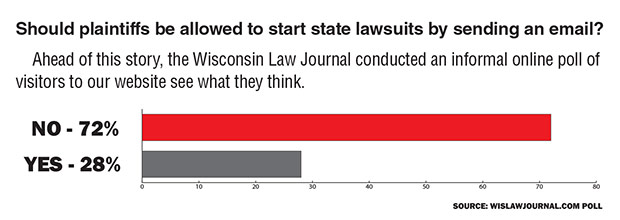YOU’VE BEEN E-SERVED: Practitioners weigh in on whether process of service should be done electronically
By: Erika Strebel, [email protected]//September 6, 2017//
YOU’VE BEEN E-SERVED: Practitioners weigh in on whether process of service should be done electronically
By: Erika Strebel, [email protected]//September 6, 2017//

More and more in all walks of life, paper processes are getting replaced with electronic ones.
So it should be no surprise that the legal system, although a bit slowly, is moving in the same direction. Some of the biggest changes are now taking place in Wisconsin’s court system, which has been slowly putting in place a system requiring lawyers to electronically file motions and other documents after a lawsuit has been initiated.
To some, the next logical step would be to allow litigants to start lawsuits merely by attaching a summons and complaint to an email and hitting the send button. Linda Emery, a lawyer at von Briesen & Roper who specializes in technology law, says new technologies may soon make service by email a reality.
As an example of what she has in mind, Emery noted the blockchain, a technology meant to create indelible digital records of individual transactions. That technology could be used to create electronic receipts showing that a particular summons or complaint had been delivered.
“My personal opinion is that it’s absolutely coming,” Emery said. “And in many ways it is a better way to do business than how we do it now. When someone’s personal space is invaded by a sheriff or process server — who perhaps shows up at work or your home and signs off that you, in fact, have been served — it’s certainly intrusive, can be embarrassing.”
Lawyers who tend to work with clients on either side of civil lawsuits, however, see drawbacks. Some say that email, despite its seeming ubiquity, is still not used by enough people to make a change of the rules easy or wise.

Bruce Boyden, a Marquette University law professor who studies technology and its effect on the law, acknowledged that the federal rules of civil procedure give practitioners various options for serving defendants. In Wisconsin, though, the requirements stipulate a series of attempts by different methods.
“I think the issue is going to be whether email is comparable to regular mail in providing a likelihood that the recipient is actually going to get notice of the lawsuit,” he said.
Boyden says he doesn’t think the world is quite there yet, mainly because a plaintiff has no way of knowing for certain that a prospective defendant has actually read an email. Boyden pointed out that not everyone is in the habit of regularly checking email.
Briane Pagel, a consumer litigator at Madison-based Lawton & Cates, said the questions about reliability are not the only source of unease. There are also concerns about email accounts that more than one person might have access to. Pagel, for instance, estimated that about 75 percent of his acquaintances have their primary account through their work.
“You don’t necessarily want all your legal mail to be filtered through your place of employment,” he said.
Also, family members and other people could have access to an email account. A firewall might prevent an email from ever being read, said Chad Kreblin, a personal-injury attorney at Hupy and Abraham in Milwaukee. Kreblin acknowledged that, in his roughly 17 years of practice, he’s seen a huge change in the way people use email.
“It’s definitely the way things are going, but there has to be a more definitive way of knowing it got there and it was the person you wanted to serve who opened it,” said Kreblin.
Jay Urban, a Milwaukee personal injury lawyer with Urban & Taylor, agreed and noted that texting might be more reliable alternative because telecom providers typically check the credit, age and other attributes of potential customers.
Laurie McLeRoy, a defense litigator at von Briesen & Roper in Milwaukee, said critics like Urban and Kreblin are right to have misgivings about the reliability of email. She also pointed out that Wisconsin’s default statutes are generally stricter than those found in other states.
McLeRoy said she regularly warns clients that if they fail to respond a summons and complaint, the consequences are often serious and nearly impossible for her to undo. Without businesses being required to designate an email for service of process, summonses and complaints could easily get lost or deleted, she said.
Jon Axelrod, a civil litigator at Madison-based DeWitt Ross & Stevens, points out that Wisconsin already has a system in place that could be built upon to establish a formal process that could be used to serve businesses entities by email. Corporations that do business in Wisconsin, he noted, are now required to supply a name and address for a registered agent.
“If you have to designate a registered agent, what’s wrong with designating an email address for service?” Axelrod said.
Axelrod noted that electronic service could cut down on litigation costs. When one business wanted to sue another, it would no longer have to pay a process server to track down the appropriate executive before the complaint could be served.
Yet when it comes to individuals, Axelrod is much more cautious about the benefits of service by email. Axelrod said the opportunities for abuse here are much greater than with businesses.
That is particularly true when defendants are unfamiliar with the legal system. Axelrod noted summonses in Wisconsin tend to have a great deal of legal jargon that can be unintelligible to the general public.
“A regular person might ignore an email,” Axelrod said. “I think there’s something about the process server coming that sort of lights up a neon sign in people’s minds that this is important and something they need to take to a lawyer.”
Pagel agreed. He said the clients he represents in consumer-protection cases typically do not make a lot of money. He said he can’t see how his clients would benefit from being able to serve someone by email, regardless of what side of a lawsuit they are on.
Plaintiffs, for their part, would have no guarantee that an email sent to a particular corporate entity had been received and read by the right person. And prospective defendants — often ordinary people with no special training in legal matters — might not understand the seriousness of receiving a summons or complaint by email — if they receive the email at all.
Pagel noted that in small-claims cases involving debt collection, a response is required within at least eight days and at most 30 days. The consequences of failing to meet that deadline, he said, are not to be trifled with.
“A failure to respond to that can waive all kinds of rights, can result in a judgment or a garnishment against them,” he said. “Lots of times those debts are years and years old, too, when a debt collector gets their hands on it. … The email information for you, if they have it, might be outdated.” Follow @erikastrebel
Legal News
- Waukesha man sentenced to 30 years for Sex Trafficking
- 12-year-old shot in Milwaukee Wednesday with ‘serious injuries’
- Milwaukee man convicted of laundering proceeds of business email compromise fraud schemes
- Giuliani, Meadows among 18 indicted in Arizona fake electors case
- Some State Bar diversity participants walk away from program
- Wisconsin court issues arrest warrant ‘in error’ for Minocqua Brewing owner
- Iranian nationals charged cyber campaign targeting U.S. Companies
- Facing mostly white juries, are Milwaukee County defendants of color truly judged by their peers?
- Milwaukee Mayor speaks in D.C. Tuesday at White House water summit
- Chicago man sentenced to prison after being caught with ‘Trump Gun’
- FTC bans non-competes
- Gov. Evers seeks applicants for Dane County Circuit Court
WLJ People
- Power 30 Personal Injury Attorneys – Russell Nicolet
- Power 30 Personal Injury Attorneys – Benjamin Nicolet
- Power 30 Personal Injury Attorneys – Dustin T. Woehl
- Power 30 Personal Injury Attorneys – Katherine Metzger
- Power 30 Personal Injury Attorneys – Joseph Ryan
- Power 30 Personal Injury Attorneys – James M. Ryan
- Power 30 Personal Injury Attorneys – Dana Wachs
- Power 30 Personal Injury Attorneys – Mark L. Thomsen
- Power 30 Personal Injury Attorneys – Matthew Lein
- Power 30 Personal Injury Attorneys – Jeffrey A. Pitman
- Power 30 Personal Injury Attorneys – William Pemberton
- Power 30 Personal Injury Attorneys – Howard S. Sicula











